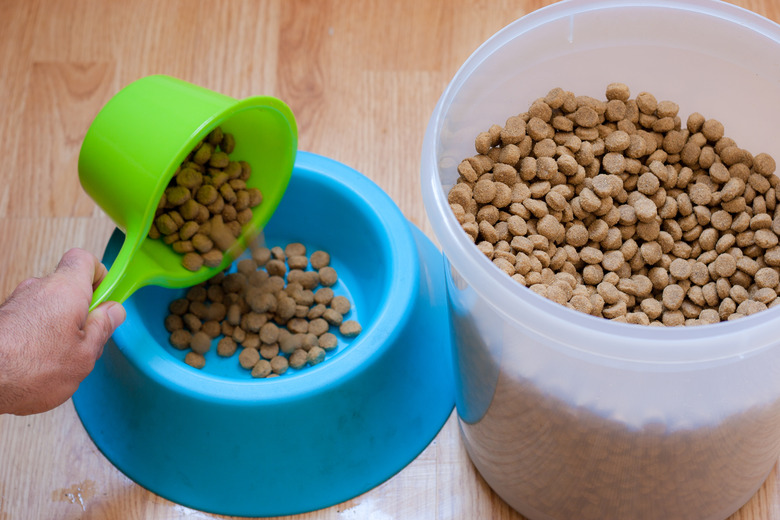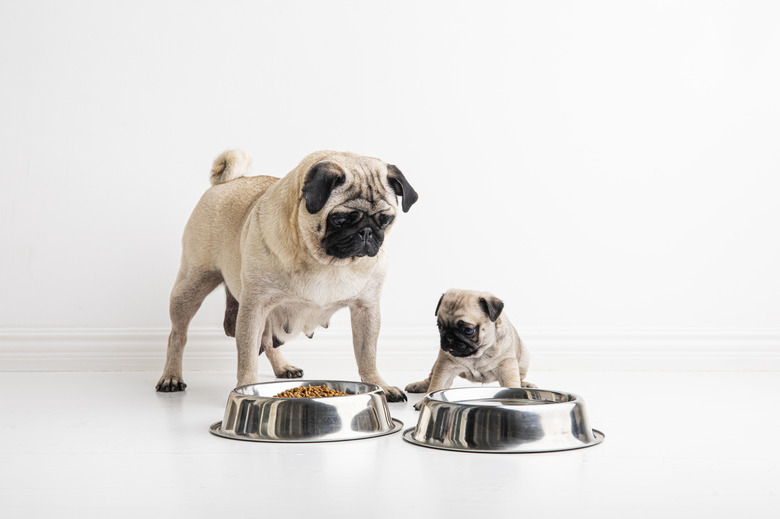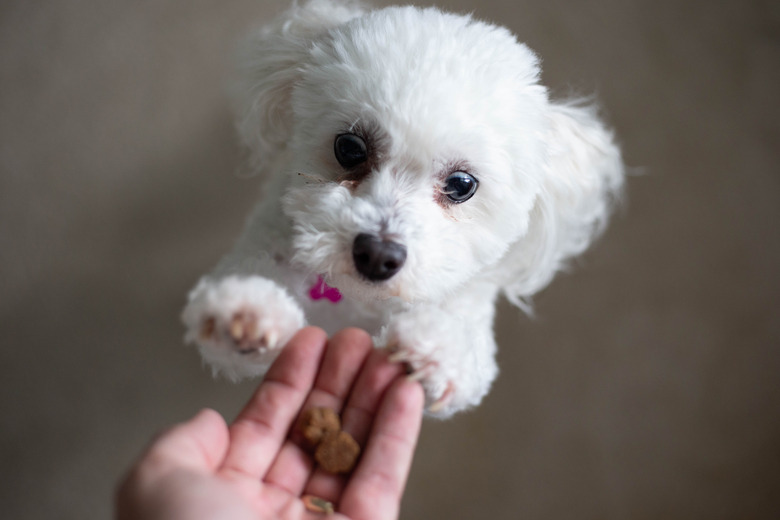When To Start Feeding Puppies Solid Food?
We may receive a commission on purchases made from links.
Cuteness may earn compensation through affiliate links in this article.
Having a puppy is a big responsibility. Not only do you have to do obedience training, but you also have to make sure they're eating the right foods at different stages of their life so they grow up healthy and strong.
Unlike adult dogs, they need a higher caloric intake as well as certain nutrients to ensure they are getting enough nutrition. They are much more fragile than adult dogs and need pretty constant supervision.
If you've just brought home a new puppy, here are some tips on when you should start feeding him solid food.
When do you feed a puppy solid food?
When do you feed a puppy
solid food?
Your dog will exclusively drink from his mother's milk for the first month of life. If your dog is having trouble latching, can't reach the milk because the other puppies are too aggressive, or he isn't growing, then you will need to buy a milk replacer and feed your pup manually one to six times per day, every day. Keep in mind that your puppy needs to gain 5% to 10% of his body weight daily.
Then, you can feed your puppy solid food when he's around four weeks of age. You can mix wet or dry puppy food with an equal serving of puppy formula/milk replacer. This is because your dog still needs those nutrients and the milky mix is easier for him to chew. As your dog starts to grow teeth around the first four to six weeks, then you can slowly decrease the amount of moisture in the mix and just feed him solid food instead. Up until your dog is six months of age, you need to feed him three to four times per day. After that, you can decrease it to once in the morning and once at night, like regular adult dogs.
Here is how much to feed your puppy every day based on his weight:
- If he weighs 5 pounds, then
feed him ½ cup to 5/8 cups - If he weighs 10 pounds, feed
him ¾ cup to 1 cup - If he weighs 20 pounds, feed
him 1 ¼ cups to 1 ¾ cups - If he weighs 26 to 50
pounds, feed him 2 to 2 2/3 cups - If he weighs 76 to 100
pounds, feed him 3 1/3 to 4 ¼ cups
When your dog becomes mature – which is when he is fully grown – then they can start eating adult food. This is around one year of age, but if your dog is a larger breed, then it could take up to two years. You'll need to ask your veterinarian if your dog is at his adult size yet.
What food is best for different breeds?
What food is best for
different breeds?
The truth of the matter is that breed-specific dog food is usually nothing more than a gimmick. As long as you feed your dog high quality food that is appropriate for his stage in life, then he should be fine. He needs to eat puppy food when he's young, for instance, because it will contains all the nutrients he needs to grow up healthy. Plus, it's more caloric than adult food, and he needs those calories.
If you notice that your dog is having certain health issues, then you can always ask your vet if you need to switch to a different type of food. For instance, if you have a Golden Retriever, he might have joint issues if his diet is very high in calcium or calories. You can inquire with your vet about what food would be best for your Golden Retriever in this case.
What should puppy food contain?
What should puppy food
contain?
Good puppy and adult dog food will contain ingredients like meat, grains, vegetables, and fruit, and it won't contain unnecessary things like corn, soy, corn syrup, artificial colors, MSG, artificial flavors, vegetable oil, animal by-products, salt, or sodium nitrate. Typically, wild caught fish is better than farmed fish as well. Even though high-quality dog food is going to cost more, it is going to be better for your puppy and could help him avoid health issues later on.
Finding the best puppy food
Finding the best puppy food
If you're searching for good, high-quality puppy food, then try Blue Buffalo Life Protection Formula Natural Puppy Dry Dog Food, which comes in two flavors: chicken and brown rice or lamb and oatmeal. It contains real chicken, along with wholesome vegetables and fruits, along with DHA and ARA, which are fatty acids that are found in a mother's milk support retinal health and cognitive function. It contains no artificial flavors, chicken by-product meals, wheat, corn, or soy.
Another solid option is Taste of the Wild Dry Dog Food With Roasted Bison And Roasted Venison, which contains real meat as the no. 1 ingredient. It also has DHA for brain and vision, and no grains, corn, wheat, artificial flavors or colors, or preservatives. It has proprietary probiotics and it comes in small kibble so that your puppy can easily chew and digest it.
Conclusion
Conclusion
You can start feeding your puppy solid food around one month of age, and give him high-quality food while you're at it. Then, he will develop accordingly and live a long and healthy life.



